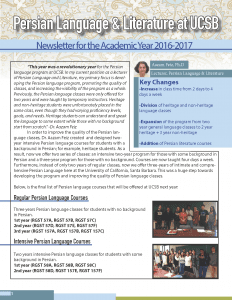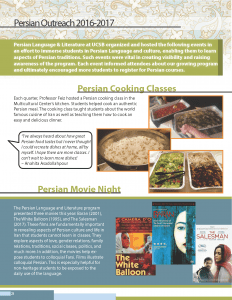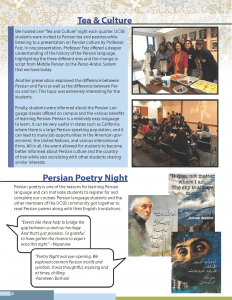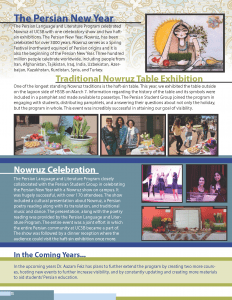These courses and other course descriptions can be found in the UCSB General Catalog. Other courses may be applicable for the minor, but they would have to be approved through the College of Letters and Science using their petition process.
PREPARATION
History 8. Introduction to History of Latin America
The course will deal with major issues in Latin America’s historical formation: pre-Hispanic cultures, the Spanish conquest, the role of colonial institutions, the development of trade, eighteenth-century reform, independence, the formation of nations; and identify major issues in current Latin American affairs.
Religious Studies 14. Introduction to Native American Religious Studies
This course is designed as an introduction to the contribution that Native American religions make to the general study of religion. Metaphysical and philosophical aspects of North American native culture. Major concepts of belief systems, religion, and medicine. Theories of balance, harmony, knowledge, power, ritual, and ceremony.
UPPER DIVISON
ANTHROPOLOGY
ANTH 104H. People, Poverty, and Environment in Central America (4)
Prerequisites: Anthropology 2 or Environmental Studies 1 or 3.
Analysis of the interrelated social, demographic, economic, political, and environmental crises occurring in Central America from an anthropological perspective. Emphasis on the evolution of contemporary problems, current conditions and future prospects for the region.
ANTH 113. Indigenous People and the Nation State in the Americas (4)
Prerequisite: ANTH 2 or CH ST 1A, 1B, or 1C. .
The changing relationship between indigenous people and the state. Compare the differences and similarities between indigenous peoples’ mobilizations in the cases of Canada, USA, Ecuador, Chile, Guatemala, Bolivia and Mexico.
ANTH 116. Myth, Ritual, and Symbol
Prerequisite: Anthropology 2.
Uses ethnographic case studies, films and performance videos to explore myth, ritual, and symbolism cross-culturally. Compares and contrasts the symbolic dimensions of gender and ethnic identity, world view, social and political organization in different societies.
ANTH 127. Hunters and Gatherers
What do Pygmies, Aborigines, and Eskimos have in common? What is the relationship between nature and culture in these simple societies? These questions and others will be examined through case studies and cross-cultural comparisons.
ANTH 131. North American Indians
The origins, development, and attainments of New World aboriginal cultures north of Mexico. Some emphasis is given to California groups such as the Chumash.
ANTH 131CA. California Indians
Investigation of the diversity of California Indian societies at the beginning of European colonization, including social organization, economy, material culture, and ideology. Also considered are origins and historic changes. Emphasis is placed on central and southern California.
ANTH 133. Cultural Development in Mesoamerica
The rise and fall of various ancient civilizations such as those of the Maya, Aztecs, Toltecs, Teotihuacanos, and Olmec as well as their cultural antecedents. This course uses self-paced audiovisual modules as well as traditional lecture format. (Offered periodically)
ANTH 135. Modern Mexican Culture
The impact of dependency, industrialization, urbanization, technology, and modern communications on Mexican society in the twentieth century. Examination of recent sociocultural contemporary urban and rural communities, class structure, value orientations, ethnic minorities, and national integration.
ANTH 136. Peoples and Cultures of the Pacific
The aboriginal and modern cultures of Polynesia, Melanesia, and Micronesia.
ANTH 139. Indigenous Peoples
Survey of indigenous societies, including: resistance response and adaptations to colonial incursions; colonial and postcolonial politics; ethnic and cultural assimilation; indigenous ethnic resistance; indigenous political movements. Other topics explored include ethnocide and ecocide; indigenous property rights; effects of globalization.
ANTH 141. Agriculture and Society in Mexico
The evolution of rural Mexico: from origins of Mesoamerican agriculture to the rise of high civilization; from the establishment of the colonial system to the demise of colonial agricultural institutions; from the revolution of 1910 to the enactment of land reform and development programs. Emphasis will be made on the role of peasantry in the making of the modern state.
ANTH 150A. The Archaeology of the Andean Preceramic
Prerequisite: Anthropology 3 or 3SS or 5. The evolution of rural Mexico: from origins of Mesoamerican agriculture to the rise of high civilization; from the establishment of the colonial system to the demise of colonial agricultural institutions; from the revolution of 1910 to the enactment of land reform and development programs. Emphasis will be made on the role of peasantry in the making of the modern state.
ANTH 150B. Archaeology of Andean Civilizations
Prerequisite: Anthropology 100. The evolution of rural Mexico: from origins of Mesoamerican agriculture to the rise of high civilization; from the establishment of the colonial system to the demise of colonial agricultural institutions; from the revolution of 1910 to the enactment of land reform and development programs. Emphasis will be made on the role of peasantry in the making of the modern state.
ANTH 150C. The Inca Empire
Prerequisite: Anthropology 3 or 3SS.
Not open for credit to students who have completed Anthropology 150. An in-depth study of the fabled Inca Empire of South America, including archaeological and historic sources. Topics include Inca origins, political organization, economy, and social structure.
ANTH 155. Prehistory of California and the Great Basin
Prerequisite: upper-division standing. A survey of the prehistory of California and the Great Basin, which includes principally the states of Nevada and Utah. Consideration is also given to how archaeologists construct regional cultural developments and attempt to explain prehistoric cultural change.
ANTH 163. Archaeology of North America
A survey of North American archaeology exclusive of Mesoamerica. Changes in prehistoric lifeways from simple hunting and gathering to complex agriculturally based chiefdoms will be explored through the study of the development of regional traditions over long periods of time.
ANTH 175. Southwestern Archeology
Prerequisite: Anthropology 3 or 3SS. Understanding the sequence of cultural developments in the southwest United States. Reconstructing prehistoric economy and society through study of material remains, such as the cliff dwellings of Mesa Verde, Chaco Canyon’s great pueblos, and the ball-courts, platform mounds, and irrigation systems of desert Hohokam.
ANTH 187. The Clash of Cultures
Prerequisites: Anthropology 2; and, Anthropology 3 or 3SS. A historical and anthropological survey of contact between western civilization and nonwestern societies from medieval times up to the early twentieth century. Peoples covered include Khoi, Aztecs, Tahitians, Fuegians, Maori, and Northwest Indians.
CHICANO STUDIES
CHIC 117. Aztec and Maya Mythologies
Prerequisites: Chicano Studies 7A-B or 9A-B. Explores ancient Mesoamerican mythology in both its indigenous and modern Chicana representations from archeological, historical, and Chicano perspectives. Emphasizes consideration of the various forms by which mythologies are maintained.
CHIC 119. Mesoamerican Art and Artists
Introduction to public and private art in Mesoamerican cultures. Considers the social and political place of artists and their products. Focus is on the Classic Maya, but course also surveys Olmec, Teotihuacano, Mixtec, and Aztec art as well.
CHIC 120. Indigenous Mestizos of Ancient Mesoamerica
Course begins with a comparison of the meanings of mestizaje in colonial and modern times. We then look at case studies from classic and postclassic Mesoamerica that both corroborate and extend our understanding of this cultural phenomenon.
CHIC 136. Oral History, Theories and Methods
Survey of oral history as a theoretical and methodological practice, including the “testimonio” tradition. Through readings, discussions, and a small field studies component, the politics of memory and truth, and the challenges and pleasures of oral history work are considered.
CHIC 139. Native American Heritage and Chicanos
Prerequisite: Chicano Studies 1A or 1B or 1C or upper-division standing.
Explores the intense recourse to the Native American heritage during the Chicano cultural renaissance of the 1960s and 1970s. The rediscovery of the native ancestral cultures will be analyzed in poetry, prose, drama, the graphic arts.
CHIC 140. The Mexican Cultural Heritage of the Chicano
Prerequisite: Chicano Studies 1A or 1B or 1C or upper-division standing.
A panoramic view of present-day Chicano traditions analyzed from a Mexican cultural heritage perspective in order to comprehend and appreciate the uniqueness and difference of present-day Chicano culture, its achievements, and contribution to the overall American culture.
CHIC 144. The Chicano Community
Origins of the Chicano in rural Mexico; context of contact; patterns of settlement in the United States; the Chicano community, social structure, and social change; acculturation and generational patterns; community leadership and change.
Same as Sociology 144.
CHIC 150. Mesoamerican Technology and Ideology
Explores the extent to which communities and individuals can be identified in their production of material cultures. Begins and ends with examples from modern culture, then treats the production of stone tools, ceramics, and stone sculpture in classic Maya culture.
CHIC 154F. The Chicano Family
This course provides an overview of historical and contemporary research on Chicano families in the United States. Changing viewpoints on the character of Chicano families and their implications with respect to policy issues are examined.
Same course as Soc 154F.
CHIC 160. Pre-Columbian Religions, Mexican Religions, and Chicano Religions
A response to present-day indigenous spirituality movement by examining pre-Colombian religions, religion in Mexico, Chicano religion, and the impact of Spanish colonization on these traditions. Pilgrimage, altars, rituals, influence of Aztec philosophy, Mexican and Chicano spirituality are examined from a contemporary perspective.
CHIC 168A-B. History of the Chicanos
The history of the Chicanos, 1821 to the present; traces the social-cultural lifeline of the Mexicans who have lived north of Mexico.
Same course as History 168A-B.
CHIC 168F. Racism in American History
Prerequisite: History 17A or 17B or 17C or Chicano Studies 1A or 1B or 1C or Asian American Studies 1 or 2 or Black Studies 1 or 2 or 5 or 6 or 20.
Examines racism as a major ideological force in defining American society from the colonial era to the 1980s. Major focus is in the changing nature of racism as ideology as well as the relationship of racism to specific minority groups such as Afro-American, Native American, Chicanos, and Asian-American.
Same course as History 168F.
CHIC 168R. Latino Religious Traditions in Historical Perspective
Focuses on the role of religion in the Chicano/Latino historical experience. Includes pre-Colombian traditions, Spanish colonial traditions, religion of the U.S.-Mexico borderlands, immigrant religious traditions, the changing nature of Latino religions in the twentieth century.
Same as History 168R and Religious Studies 124R.
CHIC 175. Comparative Social Movements
Prerequisites: Upper-division standing.
Examination of major ethnic political and social movements of twentieth century America. Topics include: constructions of ethnic communities– music, culture, collective identity; influence of leadership, community networks, immigration. Class will specifically examine relevant Chicano/a movements
CHIC 180. Survey of Chicano Literature
This course encompasses a general overview of all genres (poetry, novel, theatre, short story, and essay) of Chicano literature. A people’s socio-historical experiences are examined to understand ethnicity, creativity, and world view.
Same course as Spanish 135.
CHIC 183. Border Narrative
Reading and analysis of US/Mexico border narratives (novels, essays, short stories, autobiographies) focusing on the problems associated with relations between countries.
CHIC 184B. Colonial Literature of the Southwest
Examination of the Hispanic/Chicano literary heritage of the Southwest. Postcolonial theories are applied to the analysis of the colonial period (1530-1821) texts. Readings include prose, epic poetry, colonial theater, memoriales by representative authors.
CHIC 186B. Music/Dance of the Chicanos
A historical perspective of Mexican and Chicano music and dance with emphasis on the indigenous cultures and other contributing cultural elements which combine to form traditional and contemporary Chicano music and dance.
CHIC 189B. The Global Underground
Explores some of the more negative aspects of globalization. Topics covered might include the trafficking of women, the exploitation of workers, and the subjugation of indigenous peoples.
COMPARATIVE LITERATURE
C LIT 153. Border Narratives
Upper-division standing. Examination of novels, short stories, and films that engage U.S./Mexico border dynamics. Considering the ways diverse, interactive processes are affecting border culture, and inquiring into the ways cultural products critically respond to these processes.
ENGLISH
ENGL 122NE.
Cultural Representations Perceptions of nature have changed throughout the history and vary across cultures. Course explores changing expressions of our changing relations to the world we live in, with emphasis on cultural movements (films, literature, newspapers, etc.) that have affected contemporary American experience.
Same as Environmental Studies 122NE.
ENGL 134NA. Native American Writers
Prerequisites: Writing 2 or 50 or 109AA-ZZ or English 10 or upper-division standing. May be repeated for credit to a maximum of 12 units provided the letter designations are different, but only 8 units may be applied toward the major.
Courses on writing produced by, or associated with, cultural communities in America such as Afro-American, Native American, Chicano, Asian-American.
ENVIRONMENTAL STUDIES
ENVS 104. People, Poverty and Environment in Central America
Analysis of the interrelated social, demographic, economic, political, and environmental crises occurring in Central America from an anthropological perspective. Emphasis on the evolution of contemporary problems, current conditions, and future prospects for the region.
Same as Anthropology 104H.
ENVS 122NE. Cultural Representations
Perceptions of nature have changed throughout the history and vary across cultures. Course explores changing expressions of our changing relations to the world we live in, with emphasis on cultural movements (films, literature, newspapers, etc.) that have affected contemporary American experience. Same as English 122NE
ENVS 189. Religion and Ecology in the Americas
An overview of the growing field of religion and ecology in the Americas. Focus on spiritual traditions and land-based knowledge indigenous to the Western Hemisphere. Same as Religious Studies 193.
FILM AND MEDIA STUDIES
FILM 127. Latin American Cinema
Prerequisite: Film Studies 46 or upper-division standing.
Study of the central issues in the history of Latin American cinema from early developments to the present with an emphasis on the role of political cultures, aesthetics and nationalism in its development. This course may also be offered as a focus on one specific national film culture.
FILM 140. The Western
This course on the film western is subtitled “‘Cowboys’ and ‘Indians'” because it is taught from the conviction that filmic portrayals of “Indians” over 100 years of cinema have tended to be narrow, conventional, historically inaccurate, and racist. The quotes around “cowboys” are meant to suggest that depictions of the cowboy have also been informed by deep-seated myths of the American frontier. Thus, this course about a group of films commonly considered to make up a premier masculine genre is taught from an anti-racist, feminist, and anti-homophobic cultural studies perspective. A selection of critical readings will enable the exploration of the socio-cultural history and lure of western icons and violent actions. Attention will be paid to past and current films including those such as IMAGINING INDIANS, DEAD MAN, BLACK ROBE, and SMOKE SIGNALS that have been regarded as “counter-westerns.”
HISTORY
HIST 8. Introduction to History of Latin America
The course will deal with major issues in Latin America’s historical formation: pre-Hispanic cultures, the Spanish conquest, the role of colonial institutions, the development of trade, eighteenth-century reform,independence, the formation of nations; and identify major issues in current Latin American affairs.
HIST 151FQ. History and Film in Latin America
Prerequisite: History 8.
A weekly seminar discussing films relevant to different periods and topics in the history of Latin America combined with selected readings. Written assignments required.
HIST 151I. Comparative History of Native Peoples of the Americas
Prerequisite: History 2B or 2C or 8 or 156I or 179A or 179B.
Colonial English, French, Spanish, and Portuguese policies on indigenous populations and native peoples’ responses surveyed. Modern histories of native peoples in the U.S., Canada, Mexico, and Brazil emphasize legal status, place in national life, and ethnic identity in comparative perspective.
HIST 154LA. Andean History: Prehispanic and Colonial Periods
Early precolumbian states; the Inca empire; the Spanish conquest of the Inca; the formation of a colonial Andean society; movements toward independence to the end of the colonial period.
HIST 154LB. Andean History: The National Period
The birth of the modern Andean republics; the shaping of national identity; the problem of “race”; Indigensmo; political movements and revolutions from the early nineteenth century to the present.
HIST 156A. History of Mexico
Socioeconomic history of colonial Mexico with special attention on the indigenous peoples.
HIST 154LA. Andean History: Prehispanic and Colonial Periods
Early precolumbian states; the Inca empire; the Spanish conquest of the Inca; the formation of a colonial Andean society; movements toward independence to the end of the colonial period.
HIST 154LB. Andean History: The National Period
The birth of the modern Andean republics; the shaping of national identity; the problem of “race”; Indigensmo; political movements and revolutions from the early nineteenth century to the present.
HIST 156A. History of Mexico
Socioeconomic history of colonial Mexico with special attention on the indigenous peoples.
HIST 156B. History of Mexico
Post independence Mexico.
HIST 156I. Indians of Colonial Mexico
Prerequisites: History 8 or upper-division standing.
History of Colonial Nahuas, particularly focusing on indigenous sources in translation.
HIST 168A-B. History of the Chicanos
The history of the Chicanos, 1821 to the present; traces the social-cultural lifeline of the Mexicans who have lived north of Mexico.
Same as Chicano Studies 168A-B.
HIST 168F. Racism in American History
Prerequisite: History 17A or 17B or 17C or Chicano Studies 1A or 1B or 1C or Asian American Studies 1 or 2 or Black Studies 1 or 2 or 5 or 6 or 20.
(Same course as Chicano Studies 168F)
This course will examine racism as a major ideological force in defining American society from the colonial era to the 1980s. Major focus will be on the changing nature of racism as an ideology as well as the relationship of racism to specific minority groups such as Afro-American, Native-American, Chicano, and Asian-American
HIST 168R. Latino Religious Traditions in Historical Perspective
Same as Chicano Studies 168R and Religious Studies 124R
Focuses on the role of religion in the Chicano/Latino historical experience. Includes pre-Colombian traditions, Spanish colonial traditions, religion of the U.S. Mexico borderlands, immigrant religious traditions, the changing nature of Latino religions in the twentieth century.
HIST 179A-B. Native American History
A lecture course on the history of the indigenous peoples of North America from Cherokee removal to the present. The course stresses native history, relations with the U.S. government, and offers American history from a native point of view.
HIST 189E. History of the Pacific
Not open for credit to students who have completed Asian American Studies 150.
Peoples, cultures, social systems, politics, and economics of the islands of the Pacific. Prehistory, early contacts with outside peoples, colonial regimes, the transformation of colonialism, and recent developments. Contemporary issues include regional cooperation, neocolonialism, and emigration.
LINGUISTICS
LING 134. North American Indian Languages
Prerequisite: Linguistics 20. Survey of the several hundred native languages of North America, including the history of research on these languages, their classification, special structures, and their oral traditions.
LING 180. Language in American Ethnic Minority Groups
Examines the language of four American ethnic minority groups-Asian-, Hispanic-, Native-, and African-American-focusing on the special linguistic features and ways of using English in each group and on issues of inter-ethnic communication.
RELIGIOUS STUDIES
RELS 110D. Ritual Art and Verbal Art of the Pacific Northwest
Religious ethos of selected peoples of the Pacific Northwest, as is expressed in masking, body paint, art, and architecture. Study of mythology, ritual, symbolism, and contemporary developments.
RELS 114B. Religious Traditions of the Southwest
Survey of the cultures of the southwestern United States to discern the place of religion in the life of Athabascan, Pueblo, Uto-Aztecan, and native peoples of California. Consideration of the relationships between social structure, environment, and history as they affect religious behavior. Brief overview of the Native American church, folk Catholicism, curanderismo, and espiritualismo.
RELS 114D. Religion and Healing in Native America
An interdisciplinary and comparative study of representative Native American cultures and their religio-medico systems. Emphasis on understanding the experimentation, evaluation, and sacralization of the biosphere in culture to meet human physical and spiritual needs. Examination of the special place of language in well-being. Attention will be given to changes which are a result of contact with European culture.
RELS 124R. Latino Religious Traditions in Historical Perspective
Same course as Chicano Studies 168R and History 168R. Focuses on the role of religion in the Chicano/Latino historical experience. Includes pre-Colombian traditions, Spanish colonial traditions, religion of the U.S.-Mexico borderlands, immigrant religious traditions, the changing nature of Latino religions in the twentieth century.
RELS 14. Introduction to Native American Religious Studies
This course is designed as an introduction to the contribution that Native American religions make to the general study of religion. Metaphysical and philosophical aspects of North American native culture. Major concepts of belief systems, religion, and medicine. Theories of balance, harmony, knowledge, power, ritual, and ceremony.
RELS 191A. Latino Religious Thought
Examination of the influence, themes and issues in Latino religious thought. Course surveys the roots of Mexican, Chicano, Puerto Rican, and Cuban writers, theologians, and activists: Sor Juana, Vasconcelos, Moraga, Guerrero, Anzaldua, Chavez, Tijerina, Elizondo, Goizueta, Isasi-Diaz, others.
RELS 193. Religion and Ecology in the Americas
Same as Environmental Studies 189. An overview of the growing field of religion and ecology in the Americas. Focus on spiritual traditions and land-based knowledge indigenous to the Western Hemisphere.
SOCIOLOGY
SOCI 130LA. Development and Social Change in Latin America
Examines significant instances of economic, political, cultural, and social change in contemporary Latin America. Employs various perspectives to illuminate such phenomena as changing social structures, industrialization, social movements, the state, multinationals, the military, and international pressures.
SOCI 130SW. Sociology of the Southwest
Examines the historical development of the U.S. Southwest in sociological perspective. Topics include the region’s underlying political economy, the demographic, social, political, and symbolic processes that shape the region’s ethnic and cultural makeup, gender dynamics, the family, and other social institutions.
SOCI 144. The Chicano Community
Same course as Chicano Studies 144.
Origins of the Chicano in rural Mexico; context of contact; patterns of settlement in the United States; the Chicano community; social culture, and social change; acculturation and generational patterns; community leadership and change.
SOCI 130LA. Development and Social Change in Latin America
This course provides an overview of historical and contemporary research on Chicano families in the United States. Changing viewpoints on the character of Chicano families and their implications with respect to policy issues are examined. Same course as CS 154F.















